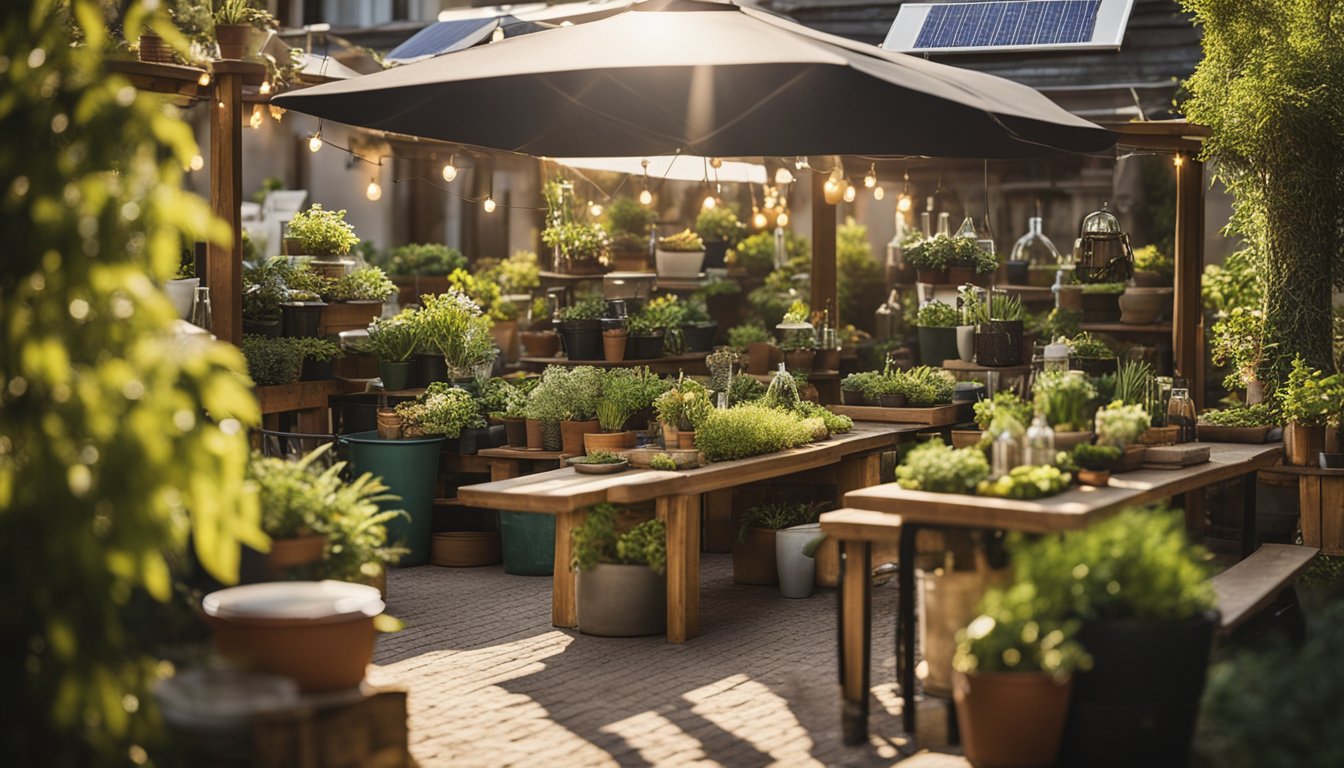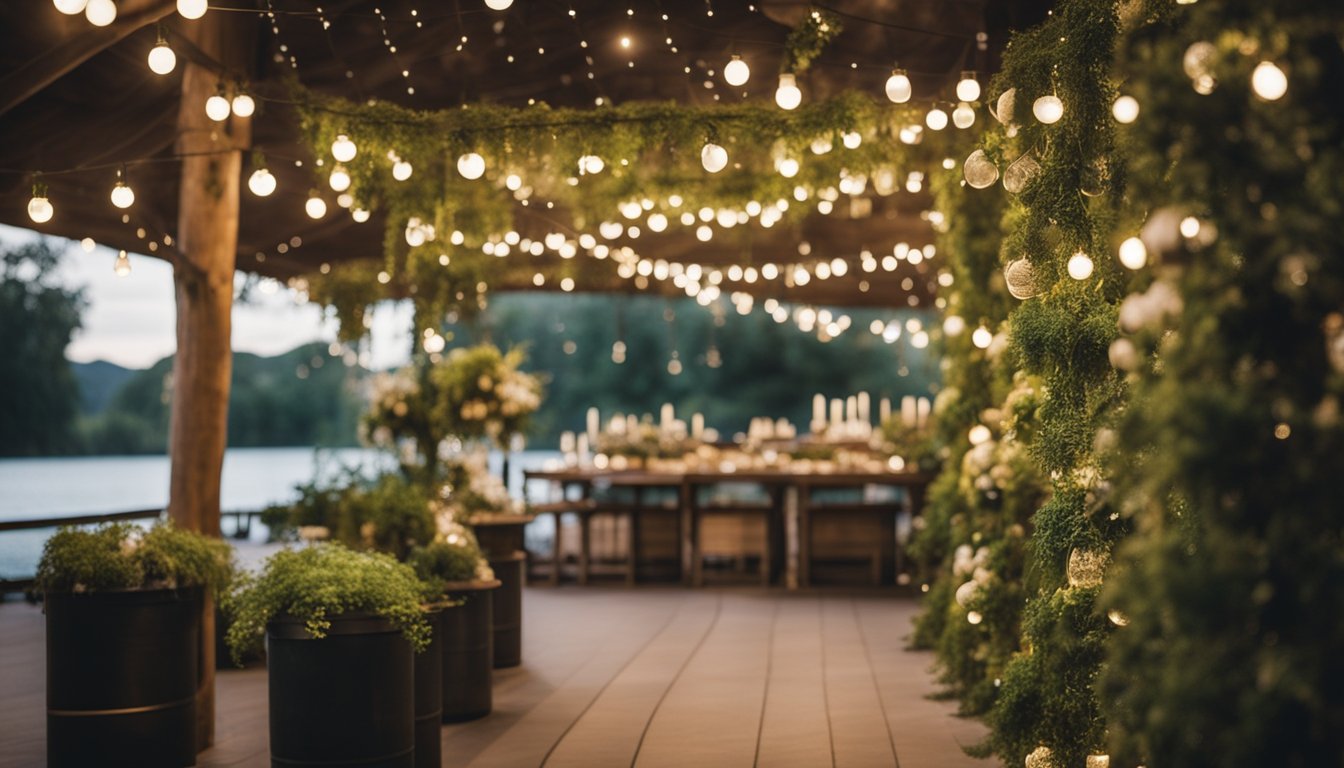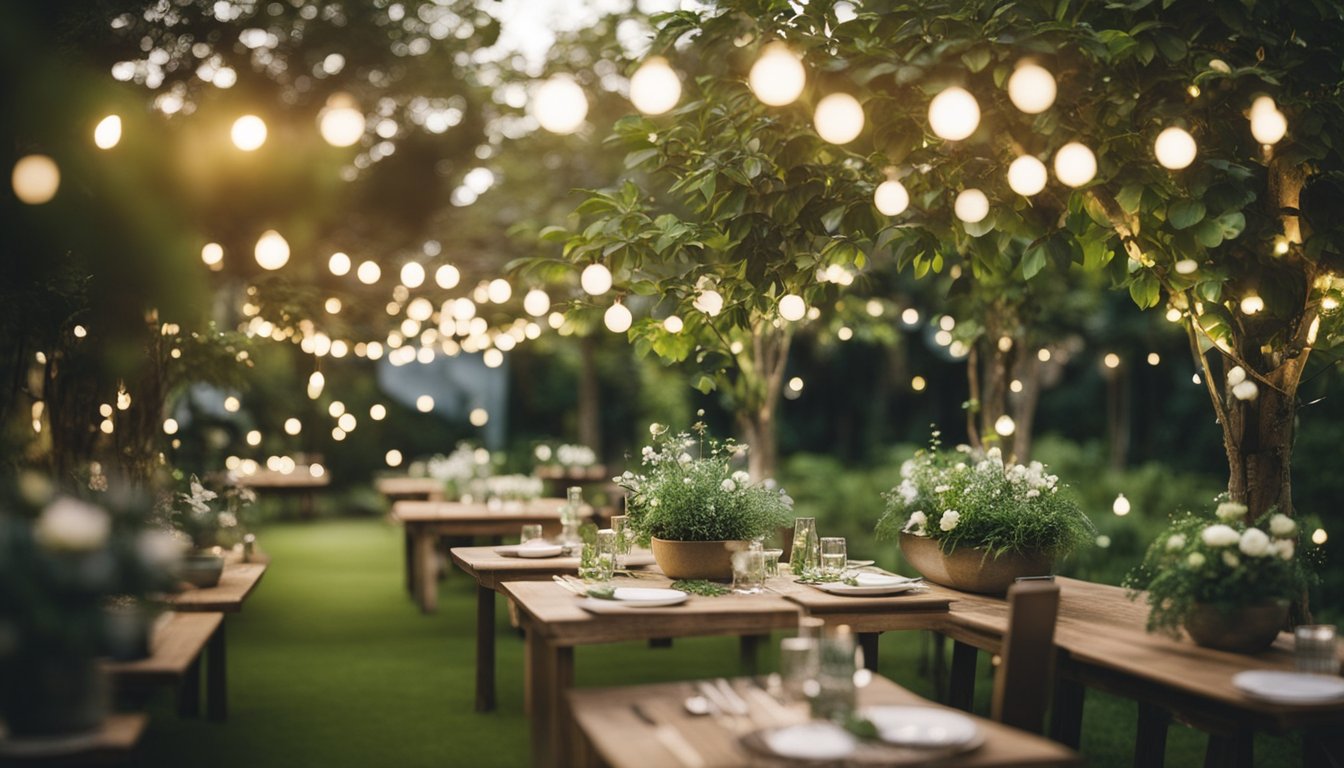Late updated: 28 Oct 2024 08:10
Written by: Sarah Hollister
Eco-Friendly Tips For A Sustainable Wedding: How to Celebrate with Minimal Impact
More couples are embracing sustainability when planning their weddings, seeking to reduce waste and environmental impact on their special day. This growing trend leads us to explore a variety of ways to host an eco-friendly wedding that aligns with values of conservation and responsibility. By focusing on sustainable practices, we not only celebrate love but also honour our commitment to the planet.

Our journey begins with thoughtful decisions, such as choosing antique or heirloom rings and incorporating rented or reused décor and tableware. These choices lend a unique charm and elegance to weddings while promoting resourcefulness and reducing unnecessary consumption. Sustainability can seamlessly integrate into every wedding detail, making it possible to enjoy a beautiful celebration that remains mindful of the environment.
From the floral arrangements to the feast served to guests, every wedding element can be curated in a manner that respects nature. By utilising seasonal flowers and setting up creative grazing tables, we create a delightful atmosphere with minimal waste. These conscious choices not only enhance the wedding’s aesthetic but ensure that the joy of the day is accompanied by eco-consciousness.
Key Takeaways
- Sustainable practices can make weddings eco-friendly and memorable.
- Choosing vintage rings and rented décor supports resourcefulness.
- Seasonal and minimal waste options elevate the wedding experience.
Planning Your Eco-Friendly Wedding
Creating an eco-friendly wedding that aligns with sustainable values can be both fulfilling and achievable. From choosing a location to selecting attire and decor, each decision can minimise the environmental impact while supporting local businesses.
Choosing a Sustainable Venue
When selecting a venue, consider those that focus on sustainability. Local venues that take advantage of natural lighting or operate on renewable energy are ideal. Look for LEED-certified venues that adhere to eco-friendly standards.
Choosing a venue close to most guests can reduce travel emissions. Supporting local businesses not only benefits the environment but also strengthens the community. Furthermore, venues with a commitment to eco-sustainability often provide additional resources and services geared towards green weddings.
Selecting Ethical Wedding Attire
Ethical wedding attire is not only beautiful but responsible. Consider attire crafted from recycled fabrics or choose a vintage wedding dress. Many ethical designers offer gowns made from sustainable materials, combining style with environmental consciousness.
Renting or buying second-hand suits can further reduce waste. Opt to support designers or brands that emphasise humane and ethical production. Embracing eco-friendly attire reflects a commitment to sustainability and can inspire guests to explore environmentally friendly fashion options for their own futures.
Invitations and Stationery
Invitations are the first glimpse guests have of your wedding. Digital invitations significantly reduce paper use and allow customisation. For those who prefer physical invitations, select recycled paper or seed paper that can be planted post-event for a blossoming reminder.
Working with vendors who specialise in sustainable invitations ensures consideration for both style and impact. Highlight the eco-friendly nature of the invitation to guests, emphasising the eco-friendly wedding ideas that will shape your celebration.
Decor and Floral Arrangements
Decor offers numerous opportunities to be eco-conscious. Incorporate vintage decor or engage in wedding rentals to minimise waste. Items that can be reused, upcycled, or rented for another event are both economical and sustainable.
Opt for seasonal flowers and local blooms sourced from nearby farms that practise ethical and sustainable floral arrangements. Consider using potted plants in place of cut flowers; they can double as favours for guests. Each thoughtful choice enhances the wedding’s atmosphere while reinforcing a commitment to the planet.
Embracing Sustainability on Your Wedding Day

Sustainability on your wedding day involves thoughtful planning across various elements, from catering to jewellery choices. By focusing on eco-friendly practices, we can significantly reduce our carbon footprint and host a memorable wedding celebration.
Catering and Minimising Food Waste
We should prioritise a menu that places emphasis on sustainability. Selecting local and fairtrade ingredients for our dishes not only minimises greenhouse gas emissions from transportation but supports local economies. Offering a vegetarian menu or meals with sustainably sourced meats can further reduce our impact.
Implementing food donation programmes ensures surplus food benefits local charities, reducing waste. Composting leftover food is another effective method for limiting the environmental impact. An elegant and sustainable wedding cake made with organic ingredients also adds a unique touch to our celebration.
Eco-Friendly Wedding Favours and Gifts
Eco-friendly wedding favours reflect our commitment to sustainability. Giving guests edible favours, like locally produced jams or honey, is both practical and appreciated. Seed paper gifts, which guests can plant to grow wildflowers or herbs, is another charming idea.
Consider eco-friendly candles or small potted plants as mementoes. If giving gifts, ensure they are sourced from sustainable shops or made with recycled materials. These thoughtful choices not only align with a green wedding theme but leave guests with lasting memories.
Jewellery and Ethical Choices
Selecting ethical jewellery is key in showcasing our values. Opting for lab-grown diamonds or sustainable diamonds reduces the ecological and social issues associated with diamond mining. Vintage engagement rings and estate jewellery are excellent choices, providing a unique charm and reducing demand for new materials.
For those desiring modern options, lab-created stones or salt-and-pepper diamonds offer beauty without compromise. Through these selections, we can enjoy stylish accessories while endorsing environmental responsibility.
Ensuring a Sustainable Celebration
Ensuring that every aspect of our wedding adheres to sustainable principles is essential in creating a truly green celebration. Choose venues that practice recycling and have sustainable operations. Encourage guests to use shuttle transportation to reduce emissions, particularly for a destination wedding.
Strive for a zero-waste wedding by incorporating recycling programmes and avoiding single-use items. Decorate using natural elements and greenery, which can often be composted post-celebration. These practices contribute to reducing our event's carbon footprint and creating an enduring message of environmental stewardship.
Frequently Asked Questions

Planning a sustainable wedding involves careful choices, from selecting eco-friendly venues to proposing innovative decoration ideas. Couples can focus on sustainable attire, responsible invitations, and even environmentally friendly confetti options.
How can one plan an environmentally friendly wedding?
We recommend starting by choosing a venue that prioritises sustainable practices. Catering should focus on local and seasonal produce. Minimising waste can be achieved by using recyclable or compostable materials. Engaging with vendors committed to sustainability can significantly reduce the event's environmental impact.
What are innovative ideas for sustainable wedding decorations?
Consider using potted plants or herbs instead of cut flowers. Reusable decorations, such as fabric bunting, can be both eco-friendly and stylish. We suggest collaborating with florists who use foam-free arrangements. Lighting with LED candles or solar-powered lights adds another layer of sustainability.
Which venues are best suited for a sustainable wedding?
Outdoor venues, such as gardens or parks, often align well with environmental values. Many farms or eco-lodges also cater specifically to sustainability-minded couples. It's important to verify the venue's dedication to sustainable operations, waste management, and renewable energy sources.
What options are available for eco-friendly wedding dresses?
Designers offer gowns made from organic fabrics or sustainable materials like hemp or bamboo. Vintage or second-hand dresses are also a wonderful eco-friendly choice. Some bridal boutiques specialise in sustainable fashion, offering a range of options for the conscious bride.
How can couples send sustainable wedding invitations?
Digital invitations are an excellent option to minimise paper usage. For those who prefer physical invites, we encourage using recycled paper or seed paper that guests can plant. Some companies offer carbon-neutral shipping or printing processes to further reduce the environmental impact.
What is considered eco-friendly confetti for weddings?
Biodegradable confetti, made from materials like dried flower petals or leaves, is a sustainable alternative to traditional plastic confetti. Another option is water-soluble confetti, which dissolves when it rains. These choices ensure that the celebration remains joyous without harming the environment.
